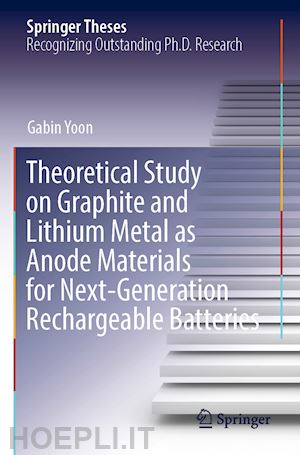
Questo prodotto usufruisce delle SPEDIZIONI GRATIS
selezionando l'opzione Corriere Veloce in fase di ordine.
Pagabile anche con Carta della cultura giovani e del merito, 18App Bonus Cultura e Carta del Docente
This thesis describes in-depth theoretical efforts to understand the reaction mechanism of graphite and lithium metal as anodes for next-generation rechargeable batteries. The first part deals with Na intercalation chemistry in graphite, whose understanding is crucial for utilizing graphite as an anode for Na-ion batteries. The author demonstrates that Na ion intercalation in graphite is thermodynamically unstable because of the unfavorable Na-graphene interaction. To address this issue, the inclusion of screening moieties, such as solvents, is suggested and proven to enable reversible Na-solvent cointercalation in graphite. Furthermore, the author provides the correlation between the intercalation behavior and the properties of solvents, suggesting a general strategy to tailor the electrochemical intercalation chemistry. The second part addresses the Li dendrite growth issue, which is preventing practical application of Li metal anodes. A continuum mechanics study considering various experimental conditions reveals the origins of irregular growth of Li metal. The findings provide crucial clues for developing effective counter strategies to control the Li metal growth, which will advance the application of high-energy-density Li metal anodes.
1 Introduction.- 1.1 Demands for energy storage system.- 1.2 Li-ion batteries.- 1.3 Post Li-ion batteries.- 1.3.1 Na-ion batteries.- 1.3.2 Li metal batteries.- 1.4 References.- 2 Na intercalation chemistry in graphite.- 2.1 Introduction.- 2.2 Experimental and computational details.- 2.2.1 Materials.- 2.2.2 Electrode preparation and electrochemical measurements.- 2.2.3 Operando XRD analysis.- 2.2.4 Computational details.- 2.3 Staging behavior upon Na-solvent co-intercalation.- 2.4 Na-solvent co-intercalation into graphite structure.- 2.5 Solvent dependency on electrochemical properties.- 2.6 Conclusions.- 2.7 References.- 3 Conditions for reversible Na intercalation in graphite.- 3.1 Introduction.- 3.2 Computational details.- 3.3 Unstable Na intercalation in graphite.- 3.3.1 Destabilization energy of metal reconstruction.- 3.3.2 Destabilization energy of graphite framework upon intercalation.- 3.3.3 Local interaction between alkali metal ions and the graphite framework.- 3.3.4 Mitigating the unfavorable local interaction between Na and graphene layers.- 3.4 Conditions of solvents for reversible Na intercalation into graphite.- 3.4.1 Solvent dependency on reversible Na-solvent co-intercalation behavior.- 3.4.2 Thermodynamic stability of Na-solvent complex.- 3.4.3 Chemical stability of Na-solvent complex.- 3.4.4 Unified picture of Na-solvent co-intercalation behavior.- 3.5 Conclusions.- 3.6 References.- 4 Electrochemical deposition and stripping behavior of Li metal.- 4.1 Introduction.- 4.2 Computational details.- 4.3 Effect of deposition rate.- 4.4 Effect of surface geometry.- 4.5 Implications of SEI layer properties.- 4.6 Consequences of the history of deposition and stripping.- 4.7 Conclusions.- 4.8 References.
Dr. Gabin Yoon received a B.Sc. degree (2013) and Ph.D. degree (2019) in materials science and engineering from Seoul National University.
His research interest lies in the theoretical study of electrode materials for Li and Na rechargeable batteries using density functional theory and continuum mechanics.











Il sito utilizza cookie ed altri strumenti di tracciamento che raccolgono informazioni dal dispositivo dell’utente. Oltre ai cookie tecnici ed analitici aggregati, strettamente necessari per il funzionamento di questo sito web, previo consenso dell’utente possono essere installati cookie di profilazione e marketing e cookie dei social media. Cliccando su “Accetto tutti i cookie” saranno attivate tutte le categorie di cookie. Per accettare solo deterninate categorie di cookie, cliccare invece su “Impostazioni cookie”. Chiudendo il banner o continuando a navigare saranno installati solo cookie tecnici. Per maggiori dettagli, consultare la Cookie Policy.